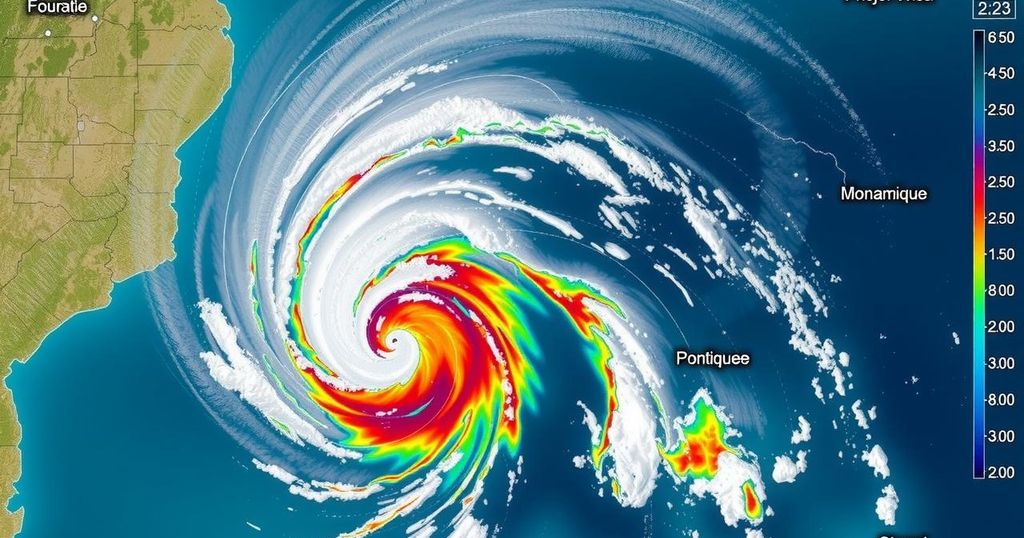Urgent Humanitarian Response Required Following Tropical Cyclone Chido in Mozambique

Tropical Cyclone Chido struck Mozambique in December 2024, affecting 453,971 people and causing significant destruction, including 120 fatalities. The most affected regions include Cabo Delgado and Nampula, where urgent needs for food, shelter, and health services have arisen alongside a cholera outbreak. Protection concerns are high due to separation of families and threats of gender-based violence. A coordinated humanitarian response is crucial to address immediate needs and facilitate recovery.
Mozambique is currently facing a severe humanitarian crisis following the catastrophic impact of Tropical Cyclone Chido, which made landfall on December 15, 2024. The cyclone unleashed torrential rainfall exceeding 250 mm within just 24 hours and strong winds reaching up to 120 km/h, resulting in widespread devastation across multiple provinces. As of December 24, 2024, an estimated 453,971 individuals have been affected, with casualties including 120 fatalities and 868 injuries. Many structures, including over 70,000 homes, 250 schools, and healthcare facilities, suffered significant damage, highlighting the urgent need for humanitarian assistance.
The most affected region is Cabo Delgado Province, where districts such as Mecufi, Metuge, and Chiure have seen nearly total destruction of housing and critical infrastructure. A substantial population, approximately 272,000, now lives in makeshift accommodations, increasing their vulnerability to the ongoing crisis. Concurrently, Nampula Province has reported alarming figures, with around 175,169 individuals impacted, alongside a rising cholera outbreak which has confirmed 302 cases and 29 fatalities. This public health emergency is exacerbated by damages to basic services and sanitation facilities.
Observations from a joint multi-agency assessment team revealed the extent of destruction—many communities have been rendered uninhabitable, and evacuation of patients is hindered by damaged roads and communication networks. Recognizing the dire situation, both governmental and non-governmental organizations are mobilizing resources and coordinated responses; however, the demands far exceed the available capacity for humanitarian assistance. Preemptive evacuations before the cyclone have helped mitigate loss of life, but immediate needs, such as shelter, food, potable water, and healthcare services, remain critical.
In the wake of the cyclone, protection concerns have escalated, particularly regarding gender-based violence and the loss of civil documentation among displaced communities. Families have been separated, heightening the risk of exploitation and abuse. Additionally, reports indicate the emergence of GBV incidents potentially involving community members. Addressing these risks necessitates a comprehensive strategy focused on both prevention and responsive measures, ensuring survivor-centered care and intervention.
This dire predicament is overshadowed by ongoing crises, including a prevailing drought affecting 1.4 million people in central and southern Mozambique and armed conflict displacing 1.3 million individuals. The urgent recovery and response efforts are also hampered by limited funding at the year’s end, emphasized by the US$5.8 million mobilized for disaster preparedness under the 2024 Humanitarian Needs and Response Plan. To maintain momentum in humanitarian efforts, a replenishment of supplies is crucial, especially to contain the cholera outbreak and support the upcoming agricultural season.
Tropical Cyclone Chido has profoundly impacted Mozambique, a country already reeling from multiple concurrent crises, including drought and armed conflict. The cyclone made landfall in December 2024, causing catastrophic flooding and structural destruction primarily in Cabo Delgado and Nampula Provinces. In addition to physical damages, the cyclone has aggravated existing public health challenges, notably a cholera outbreak. This situation demands urgent, coordinated humanitarian response efforts to address the broad array of needs arising from this disaster, particularly amidst already strained resources and infrastructure.
Mozambique’s situation following Tropical Cyclone Chido presents a complex humanitarian crisis requiring urgent intervention. With widespread destruction, staggering numbers of affected individuals, and rising protection concerns, the immediate needs for food, shelter, healthcare, and sanitation are paramount. The simultaneous challenges of ongoing conflict and drought further complicate recovery efforts. Collective and sustained action from the government and humanitarian actors is essential to mitigate the disaster’s impacts and support the communities in rebuilding their lives.
Original Source: www.unocha.org







